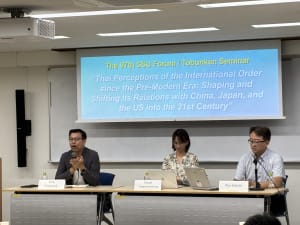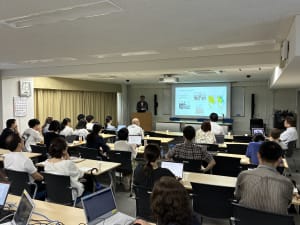Report
On July 15, a seminar titled "Thai Perceptions of the International Order since the Pre-Modern Era: Shaping and Shifting Its Relations with China, Japan, and the US into the 21st Century" was held, featuring Professor Kitti Prasirtsuk of Thammasat University as the speaker.
The seminar attracted a significant turnout, with approximately 30 participants attending in person and around 70 attending online.
The event was organized by the Institute for Advanced Studies on Asia, the University of Tokyo, as part of the JSPS-funded research project "The Historical Process of Development of the East Asian International Order: The Connection of Non-Western International Relations Theory and Area Studies," with the Security Studies Unit of the Institute for Future Initiatives, the University of Tokyo, joining as a co-organizer.
Professor Kitti Prasirtsuk delivered a comprehensive analysis of Thailand's diplomatic evolution across four historical periods. His presentation identified three recurring patterns in Thai diplomacy: pragmatism and flexibility ("bamboo diplomacy"), adaptability to changing circumstances, and openness to international engagement.
The analysis traced Thailand's relationships with major powers through distinct phases. During the pre-modern era (1351-1855), Thailand participated in the Chinese tributary system while engaging with foreign traders, embracing ties with Western powers, and integrating diverse international personnel into high governmental positions. The modernization period (1855-1945) saw strategic adaptation to Western-led international order through Western reforms and diversification of foreign ties. The Cold War era (1945-1991) marked Thailand's embrace of the US-led alliance system, while the contemporary period (1991-present) has presented challenges of navigating US-China competition amid domestic political divisions, particularly in the past two decades.
Professor Prasirtsuk emphasized Japan's recurring role as a "wild card" throughout Thai diplomatic history, from Yamada Nagamasa's military leadership in Ayutthaya, the imperial Japan’s support over the Thai-French Indochina conflicts prior to World War II,to contemporary cooperation and Japan’s economic leadership following the 1997 Asian Financial Crisis.
The first commentator, Professor Pattajit Tangsinmunkong challenged the "bamboo diplomacy" narrative as potentially an "invented tradition" rather than empirically grounded strategy. She argued that this framework selectively highlights diplomatic successes while ignoring contradictions, miscalculations, and violence.
The second commentator, Professor Sahashi Ryo, focused on tensions between normative considerations and pragmatic interests in Thai foreign policy, questioning whether democratic principles influence Thai diplomacy or are overshadowed by geopolitical hedging strategies.
Professor Prasirtsuk acknowledged presenting a "standard narrative," which somehow explained the Thai survival from Western colonization, the defeated status after World War II, and communist revolution, while recognizing the value of critical examination. He emphasized that historical diplomatic decisions were made by small elite groups, making national identity questions complex. He noted Thailand's fine performance in managing major power relationships, compared to its relations with neighboring countries.
Regarding normative considerations, Professor Prasirtsuk explained that democratic values emerged during the 1990s democratization period, citing Foreign Minister Surin Pitsuwan's "enhanced flexible engagement" policy toward Myanmar. However, Thailand's democratic regression over the past two decades has weakened its ability to champion normative issues regionally.
The Q&A session generated significant discussions about pre-modern Southeast Asia's international system beyond the Sinocentric tributary framework. Professor Prasirtsuk explained the existence of a "Mandala state" subsystem where regional powers sought subregional leadership while participating in the broader Chinese tributary framework.
Regarding the question about how Thailand's internal political divisions affect foreign policy orientation, Professor Prasirtsuk elaborated that conservatives tend toward pro-China positions, appreciating strong leadership and economic benefits, while progressives favor democratic values and advanced democracies both in the West and in Asia.
When asked about Thailand's position between Global North and South, Professor Prasirtsuk expressed concern about Thailand's lack of a clear grand strategy and foreign policy positions despite having potential leadership capabilities in areas such as agricultural expertise, medical services, and global health, particularly on tropical diseases.
The seminar successfully demonstrated both continuity and evolution of Thai diplomatic practices while highlighting contemporary practical and analytical challenges.
Event Details
Title
Thai Perceptions of the International Order since the Pre-Modern Era: Shaping and Shifting Its Relations with China, Japan, and the US into the 21st Century
Speaker
Kitti Prasirtsuk, Professor of Political Science, Thammasat University
Date
Tuesday, July 15, 2025
Time
3:00 PM – 5:00 PM JST
Venue
Main Conference Room, Institute for Advanced Studies on Asia, UTokyo & Zoom (Hybrid)
Language
English only
Discussants
- Pattajit Tangsinmunkong, Assistant Professor, Graduate School of Interdisciplinary Information Studies and Institute of Advanced Studies on Asia, the University of Tokyo
- Ryo Sahashi, Professor, Institute for Advanced Studies on Asia, the University of Tokyo
Moderator
Ryo Sahashi
Abstract
This lecture traces the historical development of Thailand's understanding of regional and international order since the pre-modern era, examining how Thailand has adapted to changing orders, particularly from the postwar period onward. It explores Thailand's evolving perceptions of Asia and the West, particularly China, the US, and Japan through tributary systems, colonial encounters, and modern geopolitics. The lecture also analyzes how Thailand navigates today's US-China rivalry, responds to Trump 2.0's disruptions to the current order, and suggests Japan's role in maintaining liberal international order.
Speaker Biography
Kitti Prasirtsuk is Professor of international relations at Thammasat University in Thailand and an advisory committee for the International Studies Center (ISC) at the Thai Foreign Ministry. His experiences include Vice Rector for International Affairs (2018-2021) and Director at the Institute of East Asian Studies (2013-2018) at his university. He used to serve as a strategic committee at the Thai Defence Ministry (2014-19).
He was a non-resident fellow at the Center on Public Diplomacy, University of Southern California (2023 – 2024). Kitti is currently a Japan Foundation fellow (2024 – 2025), researching on “local revitalization” at Kyushu University. Kitti was a visiting professor at UC Berkeley, teaching “International Relations in Southeast Asia,” and gave lectures at various universities, such as ANU, Munich, Waseda, Peking, Fudan, Korea, and Yonsei. He has been invited to speak, including at Columbia University, Nikkei Forum, Beijing Forum, Jeju Forum, and ISEAS-Yusof Ishak Institute.
Earning an M.A. from Keio University and a Ph.D. from UC Berkeley, Kitti has a wide range of publications, including those on U.S. – Thailand security alliance, Japan-Southeast Asia relations, ASEAN, maritime security, and Thai politics. His recent writings include “Thailand,” in Hall, Lee Brown, and Strating (eds.), Blue Security in the Indo-Pacific (Routledge, 2025).
Hosts
- Institute for Advanced Studies on Asia, the University of Tokyo
- Security Studies Unit, Institute for Future Initiatives, the University of Tokyo
- JSPS Project "The Historical Process of Development of the East Asian International Order: The Connection of Non-Western International Relations Theory and Area Studies"


